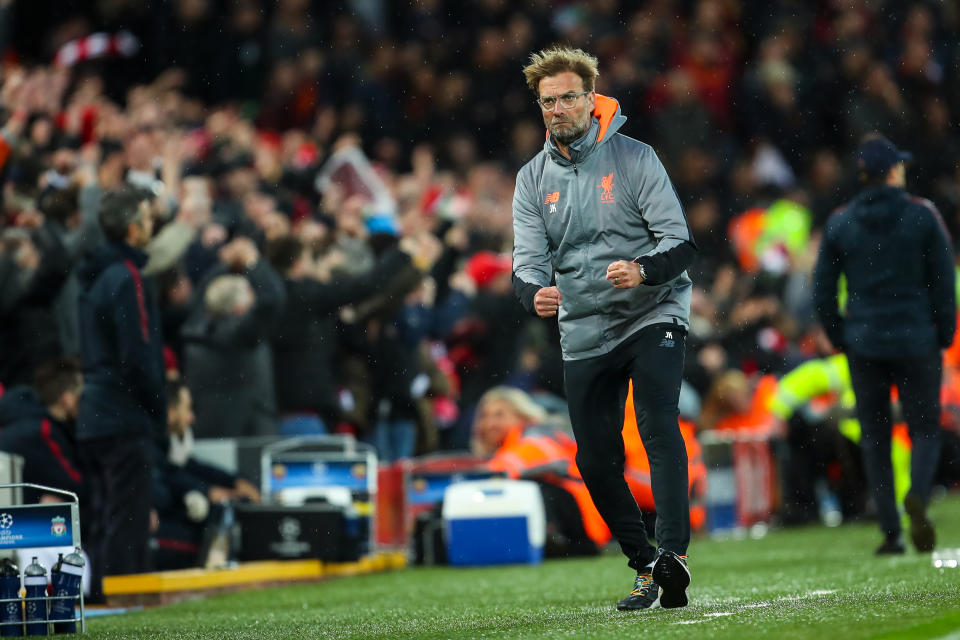Can Roma make up for naive tactical approach in second leg vs. Liverpool?

It was not quite unprecedented. Not quite unfathomable. But rarely has the UEFA Champions League seen anything like it saw Tuesday night at Anfield.
Not since 1995 had it seen five goals from a single team in a single game this late in the competition. Rarely has one semifinalist appeared so dominant. Rarely has another semifinalist looked so inadequate. Rarely has a semifinal tie been decided in 70 minutes.
Thanks to two late goals in leg No. 1 of semifinal No. 1, Roma has life. But only a bit of life. FiveThirtyEight gives Liverpool a 94 percent chance to advance to the Champions League final. The tie isn’t over. But it’s pretty darn close.
And it’s close to over because Roma manager Eusebio Di Francesco set his side up to fail.
He approached Tuesday’s match with needless desperation, like a second leg in which his side needed to undo a three-goal deficit. Because he did, that’s precisely the position he finds himself in for the second straight round. And this time, there’ll be no comeback. There’ll be no miracle. Because Liverpool isn’t Barcelona.
That’s one of a few things Di Francesco inexplicably failed to understand in preparing for Tuesday’s game. Or so it seemed.
Di Francesco essentially copied his approach from that memorable Barca game two weeks ago, the 3-0 victory that the Eternal City will remember for eternity. And on the surface, a manager staying true to what has worked in the past is understandable, if not laudable.
But this was a strange type of proactive approach. Because it was initially a reactive approach. Prior to the Barcelona second leg, Roma had played a three-man defense approximately zero times all season. It was a system – with its high defensive line, aggressive wingbacks and active press – designed to overwhelm a conservative Barca team with no vertical threats.
Liverpool, though, is the anti-Barca in so many ways. First of all, it has pace up top. Second, it plays a front three rather than a front two.
Against Barcelona, one of Roma’s back three – Juan Jesus, Kostas Manolas and Federico Fazio – could follow Lionel Messi or Luis Suarez into midfield and attempt to cut out passes, with the knowledge that the other two of the three had a numerical advantage behind them. They had cover, and therefore security.
Against Liverpool, that wasn’t the case. If Manolas challenged Roberto Firmino and lost out – like he did at the beginning of Liverpool’s 50-minute barrage – suddenly the lead-footed Fazio was isolated against the lightning-quick Sadio Mane. That’s a recipe for disaster:
فرصة ماني pic.twitter.com/wCHw4pQx7K
— UCL MEDIA (@UCL4ARMEDIA) April 24, 2018
Roma’s only hope was to stop the counterattacks and quick-strike balls over the top at source. And for 20 minutes, it did that relatively well.
But Di Francesco’s expectation that his midfielders would be able to maintain constant pressure on the ball for 90 minutes was completely unrealistic. Around the 25th minute, pressure waned, and the floodgates opened:
ماني يهدر فرصة أخرى pic.twitter.com/7xkZ1g1Osa
— UCL MEDIA (@UCL4ARMEDIA) April 24, 2018
Never mind numerical advantages. Put Fazio and his defensive colleagues near the halfway line with space behind them, and chances are they aren’t going to be able to cope with the speed of Liverpool’s attackers. For the second goal, Mohamed Salah simply outran Fazio and Jesus after Manolas’ soft attempt at a tackle on Firmino:
It's getting silly, folks.
Mo Salah AGAIN. His 43rd goal in all competitions this season. pic.twitter.com/ng4fkRt5Ol
— FOX Soccer (@FOXSoccer) April 24, 2018
The thought coming into the game was that, either by playing a standard back four or via cautionary instructions, Di Francesco had to rein in his fullbacks/wingbacks. He did neither, and that’s part of the reason Salah, Firmino and Mane had so much joy going forward. Why did Salah have the space to unleash a near-perfect shot in the 36th minute?
Because when Roma lost the ball in its defensive half, Aleksandar Kolarov was in a left winger’s position:

Roma took unnecessary risks. And by staying true to its style – but in a still relatively new formation – it played right into Liverpool’s hands.
Now it will have to take those same risks in the second leg. It will need a repeat of that magical night at the Stadio Olimpico two weeks ago. Naturally, you’d think, Di Francesco might replicate the approach from the quarterfinal second leg in an attempt to replicate the result.
The problem, of course, is that he already did that Tuesday. Liverpool proved, emphatically, that it was a foolish approach. And there’s no reason the Reds couldn’t do similarly next Wednesday.
Di Francesco, with his naive first-leg gameplan, backed himself into a corner. Now he has little choice but to risk embarrassment once again. And chances are he’ll get embarrassed again.
– – – – – – –
Henry Bushnell covers global soccer for Yahoo Sports. Have a tip? Question? Comment? Email him at henrydbushnell@gmail.com, or follow him on Twitter @HenryBushnell, and on Facebook.
More soccer from Yahoo Sports:
• Schaerlaeckens: No understating Salah’s first-leg greatness
• Champions League preview: Looking ahead to Bayern-Real Madrid
• Bushnell: The evolution that will define post-Wenger Arsenal
• Gulino: Wenger’s legacy is now up to us to figure out


